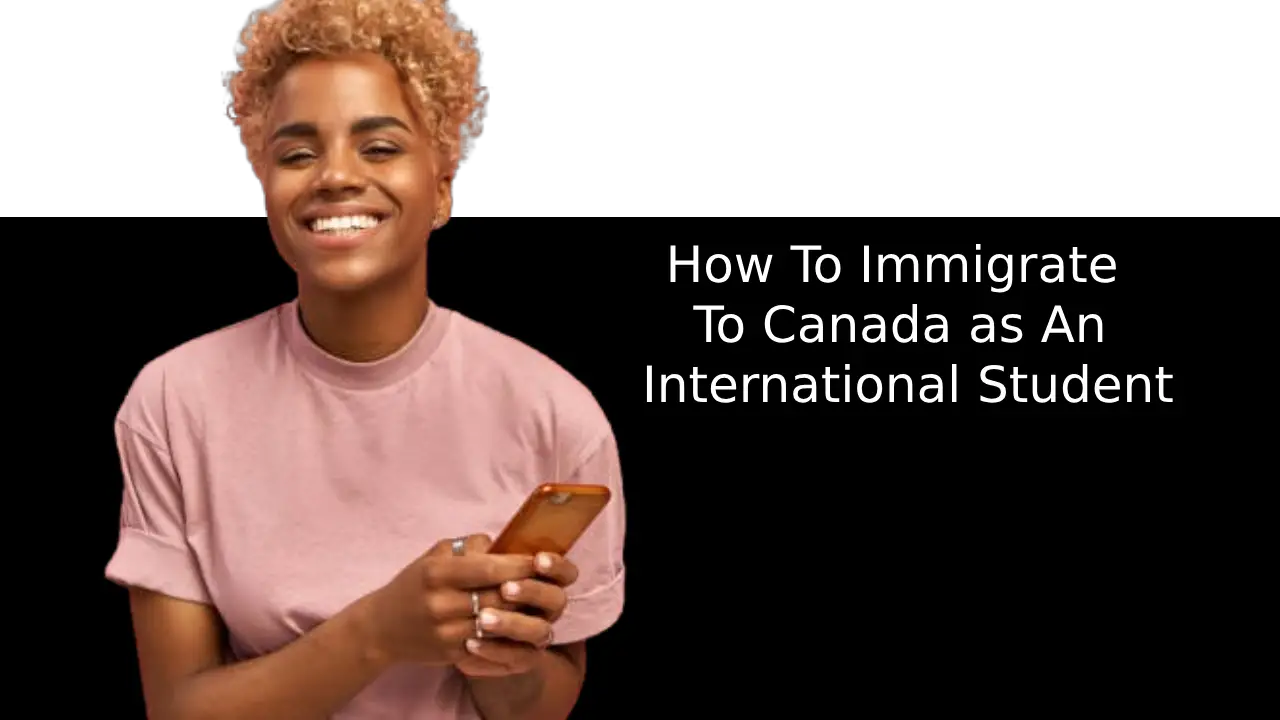The process of applying for a student Visa in Canada requires you to pass your IELTS (International English Language Testing System) exam, which tests your fluency in the English language. Taking IELTS will improve your abilities to read, write, speak, and spell the English language.
For you to be accepted into Canada as an international student and be granted Visa into Canada, you need to pass the test with at least 6.5 to 7.0. This figure is the required minimum, and if you do not pass it, you will not be granted a Visa into Canada.
Getting this score is a problem as they may not be very good with the English language. The IELTS has been one of the things that have stopped many from getting the student Visa they need to travel out.
However, there are ways one can be granted a Visa without taking the IELTS exam, so many people have used this method to travel out. This method is not illegal, nor is it the best way to do things, but it is an approved standard set by the Canadian education board for international students.
As they want to help as many who are willing to come study in Canada, they understand the importance of considering some circumstances where international students may have difficulties with the exam and, as such, may not be able to deliver a performance that is up to the approved standard.
Exams are essential in anything related to academics, but it doesn’t mean that it is an actual test of knowledge that determines how intelligent an individual is.
I will be going through how to apply for a student visa to Canada without an IELTS exam. It may cost you more than those taking the exam, but it is worth it.
- Find an institution in Canada that doesn’t require IELTS.
Several options for finding a designated learning institution (DLI) in Canada accept students without IELTS scores. For instance, Cambrian College is a renowned DLI with a diverse student population and a wide range of programs. Another great option is the University of Saskatchewan, which has a reputation for excellence in research and innovation. Also, Memorial University of Newfoundland and Labrador is a welcoming DLI with various programs across different fields of study.
If you plan to study in Winnipeg, the University of Winnipeg is an excellent DLI with a supportive learning environment and many programs. Additionally, the University of Regina in Saskatchewan offers vital academic programs and a vibrant campus community.
If you prefer smaller universities, Brock University in Ontario provides a personalized learning experience and many programs. Another DLI that accepts students without IELTS scores is Okanagan College in British Columbia, which has a supportive learning environment.
For students interested in Montreal, Concordia University is a diverse DLI with many programs. Additionally, Seneca College in Toronto is renowned for its practical and career-focused programs. Also, Carleton University in Ottawa is a welcoming DLI with programs in various disciplines.
For students planning to study in Manitoba, the University of Manitoba is a reputable DLI with a supportive campus community. Additionally, the University of Guelph in Ontario offers many programs in agriculture, business, and the sciences. Finally, Brandon University in Manitoba provides a personalized learning experience for its students.
These are just a few examples of designated learning institutions in Canada that accept students without IELTS scores. To confirm their admission requirements and application process, it is essential to research and contact the institutions directly.
- Get an acceptance letter from your chosen DLI.
By obtaining a letter of acceptance from the designated learning institution (DLI), you have chosen the next step toward a successful student visa application for Canada without IELTS. This formal document confirms your acceptance into a program of study and also verifies that you meet the institution’s language requirements. It is a vital document that you will need when applying for a study permit.
The DLI issues the acceptance letter indicating your admission status and the program you have been accepted into. It is worth noting that different DLIs may have unique requirements and application processes for issuing the letter of acceptance. Therefore, it is essential to research thoroughly and communicate directly with the institution to comprehend their specific procedures.
After obtaining the letter of acceptance, you can proceed to apply for a study permit. The Canadian government issues this document, which permits you to study in Canada for a specified duration. It is crucial to apply for the study permit soon after obtaining the acceptance letter to ensure a seamless and prompt process.
- Prepare all documents required for a study permit application.
To apply for a Canadian student visa without taking the IELTS, the next step involves preparing other necessary documents. These documents serve to establish your eligibility and smooth the application process. The initial document you must provide is proof of identity in the form of a valid passport or travel document. Ensure that the record remains valid throughout your stay in Canada. You will also need to provide proof of financial support, which could be in the form of bank statements or other financial documents that verify that you have enough funds to cover your tuition fees, living expenses, and return transportation.
Another essential document required is a letter of explanation that shows the purpose of your travel, indicating that you intend to study in Canada and have been accepted into a specific program. Furthermore, it is essential to demonstrate ties to your home country as evidence that you intend to return home after completing your studies. You can provide documentation of property ownership, employment contracts, or family ties as proof of links to your home country.
You may also be required to provide a police certificate or undergo a medical examination, depending on your situation. Specific guidelines on these requirements can be found on the Canadian government’s website.
- Apply online for a study permit through Immigration.
To apply for a study permit online through the Immigration, Refugees and Citizenship Canada (IRCC) website, a series of steps must be followed. The initial step involves creating an account on the IRCC website, enabling the applicant to access the study permit application form and submit the necessary documents electronically.
Once the account has been created, the application form must be filled out, requiring personal information such as name, date of birth, and contact details, as well as more information about the designated learning institution (DLI) and program the applicant has been accepted into.
Following the completion of the application form, required documents such as the letter of acceptance from the DLI, proof of identity, proof of financial support, and any other relevant supporting documents must be uploaded. The application fees must also be paid, which can be done online through a credit card or other accepted payment methods, with the current price being CAD 150.
After all necessary steps have been completed, the application can be submitted. The applicant may then be required to provide biometrics, which includes fingerprints and a photo, with the IRCC giving clear instructions on when and how to do so.
- Wait for your study permit application to be accepted.
Once you’ve submitted your study permit application, the next step is to await a decision. Processing time varies depending on your country of residence and the completeness of your application. It’s important to note that the processing time isn’t guaranteed and can fluctuate.
While waiting, you can track the progress of your application via an online portal or email notifications provided by the Immigration, Refugees and Citizenship Canada (IRCC) website. This will give you a sense of where your application stands.
If your application is approved, you’ll receive a letter of introduction from the IRCC, which proves your successful application. If you’re from a country requiring a temporary resident visa to enter Canada, this will also be provided along with your letter of introduction.
It’s crucial to carefully review these documents to ensure all the information is correct. Any errors or discrepancies should be addressed immediately by contacting the IRCC.
Once you’ve received the necessary documents, you can proceed with your travel arrangements to Canada. It is recommended that you keep copies of all your study permit application-related records for future reference.
- Prepare for Canada to resume your education.
Before you arrive in Canada, there are crucial steps that you should take to prepare. First, ensure that you have all the necessary documents, such as the letter of introduction, passport, proof of funds, temporary resident visa (if needed), and other documents required by the border officer. It is vital to have these documents at your fingertips as you will be required to present them upon arrival.
Besides, staying updated on COVID-19 travel requirements and quarantine rules is critical. The Canadian government has put in place measures to ensure the safety and well-being of travelers during the pandemic. Therefore, you must check the official government websites to be well-informed on the current travel restrictions, testing requirements, and quarantine protocols.
It is also necessary to familiarize yourself with the local customs and regulations in Canada, such as transportation options, cultural norms, and the local currency. Proper research and planning ahead will ease your transition to the new environment.
Finally, contact any contacts you have in Canada, such as friends, family, or fellow students. These individuals can offer valuable insights and support as you settle into your new life.
- Resume and enjoy your studies in Canada.
To ensure a fulfilling study experience in Canada, adhering to the requirements of your study permit is of utmost importance. These requirements include maintaining enrollment status and notifying the relevant authorities of any changes in your circumstances. It is also crucial to be mindful of the expiration date of your study permit and to extend or renew it as necessary.
During your studies, there may be opportunities for part-time or full-time work, depending on your eligibility and program. Such employment not only provides valuable work experience but also supports your financial needs. Ensure you are familiar with the regulations and restrictions governing work permits for international students.
In addition to your academic pursuits, take advantage of Canada’s rich cultural experiences. Engage with fellow students from diverse backgrounds, explore local attractions, and participate in community events. This will broaden your horizons and foster personal growth.
Canada is renowned for its breathtaking natural beauty. Do not miss the endless opportunities to appreciate the country’s natural wonders, from hiking in national parks to skiing in the mountains.
Lastly, prioritize your well-being by balancing academic responsibilities and leisure activities. A healthy lifestyle contributes significantly to overall happiness and success in Canada.
Conclusion
Education is one of the most essential things in this life that everyone should get. Getting a quality education should be the priority of everyone who wishes to make significant changes in the world.
We have learned about how you can quickly get a student Visa in Canada without the need for IELTS. Please prepare yourself and make all documents available for the school to accept your application.




